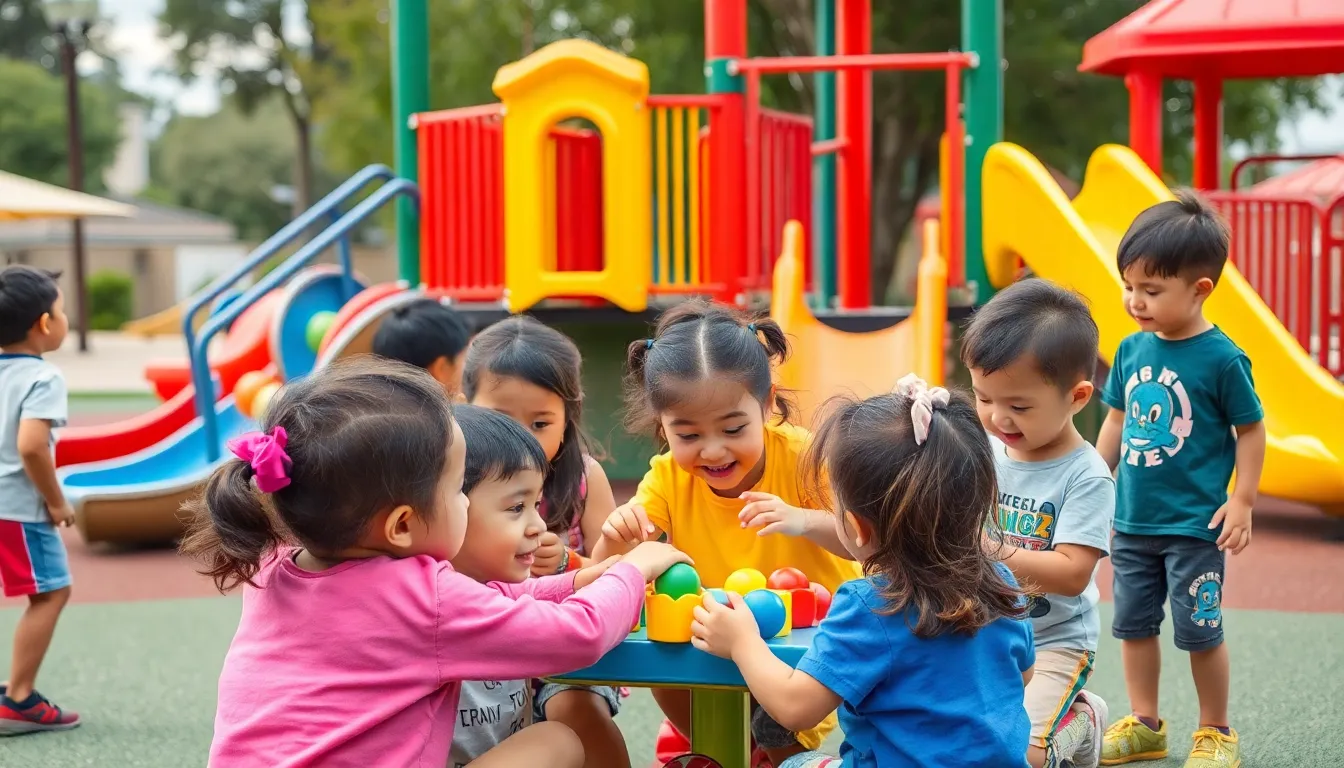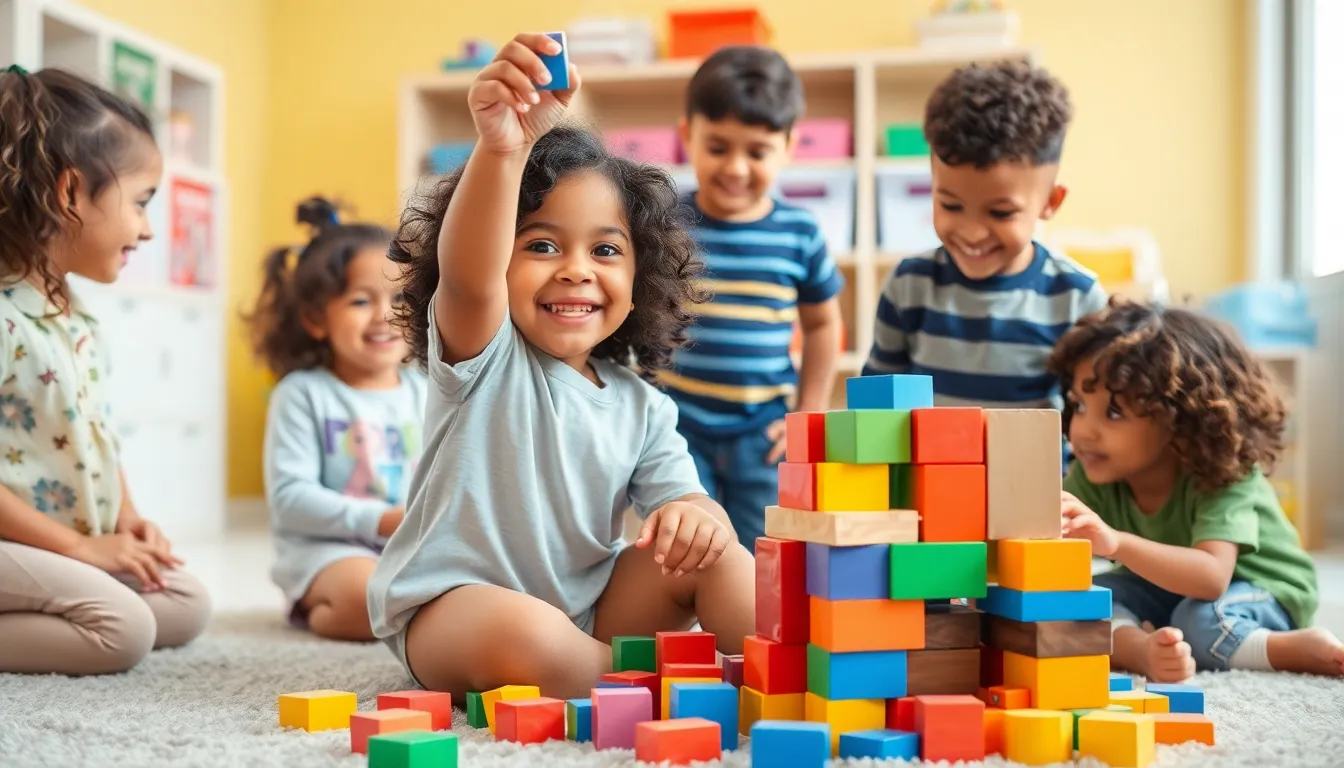In the whimsical world of early childhood education, play isn’t just a way to pass the time; it’s the secret sauce that fuels a child’s development. Imagine a classroom where laughter echoes and creativity runs wild—this is the magic of play-based learning. It’s not just about toys and games; it’s a powerful method that helps children explore, discover, and learn in ways that traditional teaching simply can’t match.
When kids dive into play, they’re not just having fun; they’re building critical skills like problem-solving, teamwork, and communication. So why should we ditch the old-fashioned worksheets? Because while they might keep kids busy, they won’t spark the same joy or curiosity. Join the movement that champions learning through play and watch as children thrive in an environment that feels more like an adventure than a classroom.
Table of Contents
ToggleOverview of Play Based Learning in Early Childhood
Play-based learning serves as a vital component of early childhood education. This method allows children to engage actively in their learning experiences. Through play, children explore their environment, which promotes curiosity and enhances cognitive development.
Creativity flourishes in play-based settings, enabling young learners to express themselves freely. They develop critical social skills by interacting with peers during cooperative games and activities. Teamwork becomes second nature as children work together towards shared goals.
Problem-solving skills emerge naturally when children face challenges during play. Instead of completing rote tasks, they learn to think critically and develop strategies that enhance their learning. Communication abilities improve significantly, as children narrate their thoughts and collaborate with others.
The benefits of play extend beyond cognitive and social domains. Emotional development also thrives in a playful environment, where children navigate their feelings and learn to manage conflicts. Building relationships with others is easier when play represents a shared experience.
Transitioning from traditional teaching to play-based learning creates a joyful atmosphere. Educators witness the excitement in children’s eyes as they embark on new adventures. Observation reveals that students are more engaged and enthusiastic about their learning when it occurs through play.
Play-based learning in early childhood cultivates a nurturing ecosystem that prioritizes holistic development. It enriches children’s lives by fostering essential skills that prepare them for future educational endeavors.
Importance of Play Based Learning

Play-based learning plays a crucial role in early childhood education. This approach fosters essential skills across multiple developmental domains.
Developmental Benefits
Development in children accelerates through active play. Cognitive skills strengthen as they interact with their surroundings. Exploration during play cultivates curiosity, allowing children to discover the world. Problem-solving abilities emerge when navigating challenges in playful scenarios. Creativity flourishes with opportunities for imaginative expression. Physical development benefits from active engagement in games and movement, enhancing coordination and motor skills. Emotional growth occurs as children process their experiences, helping them understand and manage their feelings. Research shows that holistic development, resulting from play-based learning, equips children for future academic success.
Social Skills Enhancement
Social skills significantly improve through play-based interactions. Children learn cooperation while engaging in teamwork during group activities. Sharing toys and taking turns fosters respect for others’ needs. Communication skills develop as they express ideas and negotiate roles in games. Conflict resolution skills arise when they navigate disagreements with peers. Bonding occurs through shared experiences, creating friendships that provide emotional support. Play settings encourage empathy as children learn to understand others’ perspectives. The combination of these social competencies paves the way for healthy relationships in and beyond educational settings.
Types of Play in Early Childhood Learning
Play in early childhood learning encompasses various forms, each contributing significantly to a child’s development.
Free Play
Free play involves unstructured, child-directed activities. In this mode, children choose how they spend their time, encouraging creativity and individuality. With no specific instructions, children explore their environment freely, leading to spontaneous exploration. This exploration fosters problem-solving skills as children encounter challenges and seek solutions. Examples include building with blocks, drawing freely, or engaging in imaginative role-play. These types of activities not only nurture creativity but also boost confidence as children express themselves. Furthermore, free play allows children to develop social skills by interacting with peers, negotiating roles, and resolving conflicts.
Structured Play
Structured play features organized activities with specific goals or guidelines. Designed intentionally, this type of play often incorporates learning objectives while still allowing for fun. Programs may include guided games, group activities, or learning stations with defined tasks. Structured play promotes cooperation and teamwork as children work together towards a common goal. Activities such as relay races or group art projects enhance communication skills and foster relationships among peers. Through this approach, educators can facilitate targeted learning while ensuring children remain engaged. Both free and structured play play vital roles in early childhood learning, creating a balanced and enriching educational experience.
Implementing Play Based Learning in Classrooms
Implementing play-based learning in classrooms requires thoughtful strategies and active participation from educators.
Educator’s Role
Educators facilitate play-based learning by guiding children’s exploration. They observe interactions and provide support without imposing their agenda. Encouragement of independence is key; children’s choices should lead their learning. They can ask open-ended questions to stimulate critical thinking while allowing kids to express their ideas freely. Additionally, collaboration among peers during playful activities enhances social skills. Educators model positive behaviors, promoting empathy and teamwork. In this dynamic environment, they become co-learners, exploring alongside children.
Creating an Engaging Environment
Creating an engaging environment significantly influences play-based learning. Classrooms should be filled with diverse materials that spark creativity, like blocks, art supplies, and natural elements. Design spaces to encourage exploration and movement, fostering curiosity in children. Zones that cater to different types of play—both free and structured—support various learning styles. The atmosphere must feel safe and welcoming, inviting children to take risks and experiment. Incorporating elements of nature can also enhance engagement, connecting children with the world around them. Regularly changing activities and materials keeps the environment fresh and stimulating for young learners.
Challenges and Considerations
Play-based learning, while effective, presents several challenges. Educators may encounter resistance from parents accustomed to traditional teaching methods. Parents often view worksheets and structured lessons as indicators of academic progress. Communicating the benefits of play-based learning is crucial to alleviating these concerns.
Classroom management evolves in a play-based environment. Teachers must balance supervision with allowing children the freedom to explore. Young learners might become easily distracted, requiring educators to implement strategies that maintain focus. Providing clear expectations helps children understand boundaries while engaging in play.
Incorporating diverse learning styles adds complexity to play-based learning. Children possess varying needs and preferences. Educators must adapt activities to ensure every child’s participation and enjoyment. Offering choices and flexible grouping encourages collaboration while catering to individual differences.
Assessing learning outcomes presents another challenge. Traditional assessments may not align with play-based learning frameworks. Developing new methods that reflect a child’s progress through observation and documentation is essential. Formative assessments can capture children’s skills and development throughout their play.
Resource availability also impacts the quality of play-based learning. Classrooms may lack sufficient materials to foster creativity and exploration. Investment in diverse resources is vital to ensure engaging learning experiences. Collaborating with community partners can help secure additional support and funding.
Lastly, the integration of curriculum standards into play-based learning requires careful consideration. Educators must design activities that align with educational goals while remaining playful and engaging. Striking this balance ensures children develop critical skills without compromising the joy of learning through play.
Play-based learning stands as a transformative approach in early childhood education. By prioritizing play, children gain invaluable skills that shape their future. This method nurtures creativity and fosters social interactions while promoting emotional growth.
As educators embrace play-based learning, they create dynamic environments that invite exploration and discovery. The shift from traditional methods not only enhances engagement but also prepares children for lifelong learning.
Investing in this holistic educational approach ensures children thrive academically and socially, setting a strong foundation for their future endeavors. Ultimately, play-based learning enriches children’s lives, making education a joyful adventure.



